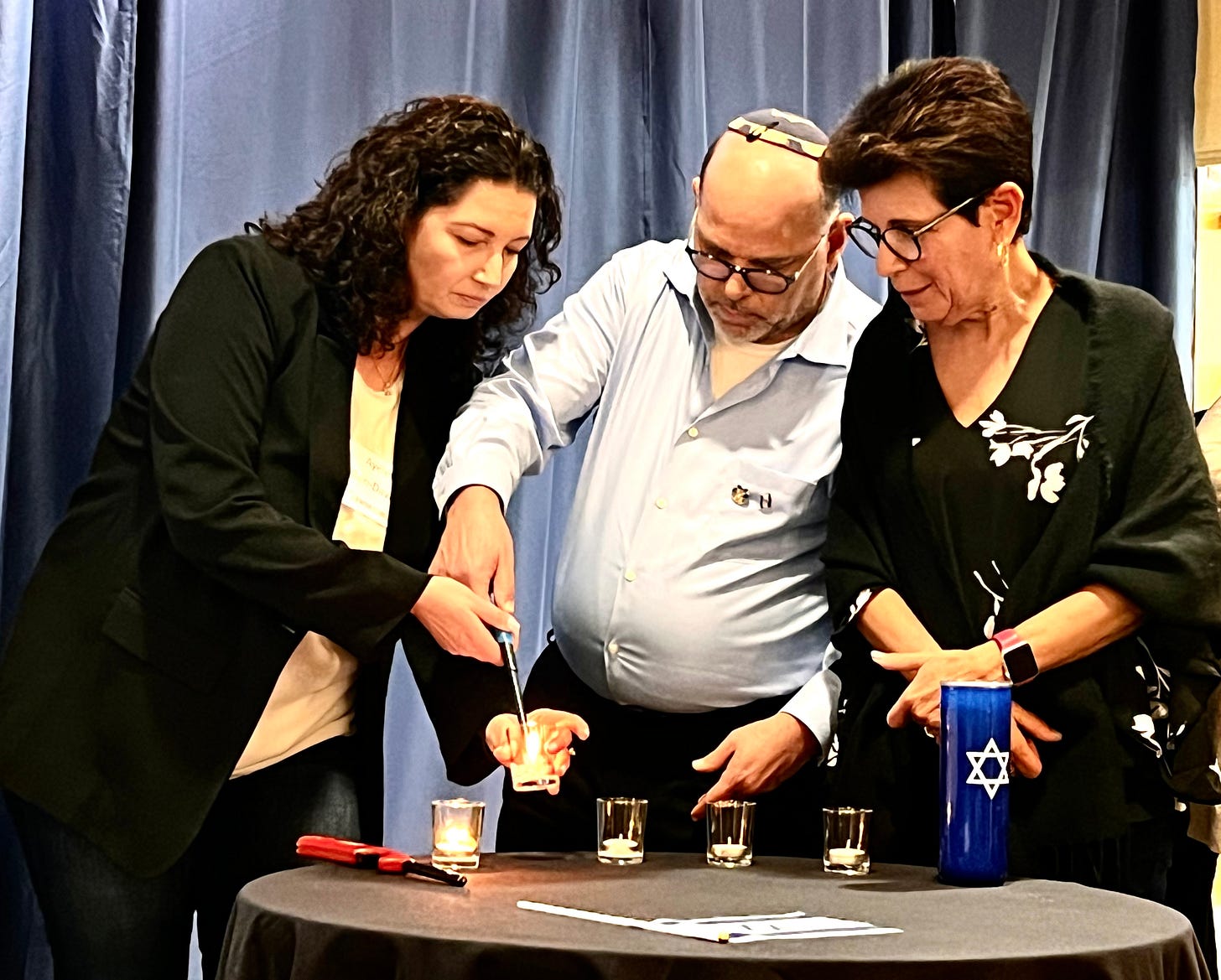
Last night, Sherrod and I attended a vigil for Israel. We walked through the doors and into a packed room pulsing with pain and grief.
The service, organized by JewishColumbus, took place before an overflow crowd at the Jewish Community Center of Greater Columbus. Rabbis and other Jewish community leaders stood side by side, their faces painting a montage of grief. At different points in the service, one or more of them raised their faces to the dark sky as tears pooled in their eyes.
An Israeli spokesperson said Monday that Hamas’s unprecedented attacks killed more than 900 Israelis, most of them civilians. Eleven of the dead were Americans. More than 260 of them were young people attending a music festival about 3.3 miles from the wall that separates Gaza from southern Israel.
“We were hiding and running, hiding and running, in an open field — the worst place you could possibly be in that situation,” 26-year-old Arik Nani told the Associated Press. “For a country where everyone in these circles knows everyone, this is a trauma like I could never imagine.”
Hamas has taken at least 150 Israelis hostage, including children and elderly citizens, and is threatening to execute them if Israelis target civilians without warning.
Israel is retaliating. The Israel Defense Forces said that, on Monday morning, it struck 130 targets in Gaza within three hours. Israel is also restricting food, electricity, and fuel. Recent reporting estimates that about 680 people have been killed in Gaza, including at least 33 children. Thousands on both sides have been wounded, and the death toll continues to rise.
About 100,000 Israeli reservists have been called up to serve. Some of these young people are children of our friends; others are grandchildren. These are hard conversations. It is impossible to imagine any child, at any age, in danger, and not think of children in your own life. Love, like grief, is a universal language.
As we approached the vigil last night, we couldn’t help but notice the heavy police presence. This, too, is what it means to be Jewish in America. As PBS reported earlier this year, antisemitism is on the rise in our country.
An excerpt from the report cited by PBS, written by Tel Aviv University’s Center for the Study of Contemporary European Jewry and the U.S.-based Anti-Defamation League:
“American Jews have lived securely in the knowledge that civil society and its institutions are a reliable buffer against discrimination, prejudice and violence. Violent attacks on Jews and Jewish institutions in recent years have shattered the perception of exceptionalism.”
I have visited many synagogues over the years, and I do not recall ever entering one that is not protected by police or private security guards. This always unnerves me, even as synagogue members shrug their shoulders in acceptance. About three years ago, a friend of 20 years saw me staring at a police officer just inside the synagogue entrance and placed his hands on my shoulders.
“We are Jews, my friend,” he said, smiling softly. “We do what we must to survive.”
As a practicing Christian, I have never feared for my life. Not for one moment have I worried that the traditions of my religion—the crosses around our necks, the Christmas lights in our windows, the mere bowing of our heads in prayer—will provoke acts of violence against us.
I have always found the sound of prayers sung in Hebrew to be reassuring and familiar. I’m not sure why, as I did not grow up with this tradition. I had only one Jewish classmate and I never heard her speak of her faith. She was beautiful and popular. Her capacity for kindness made me feel inferior and self-conscious.
“She has to be kind,” my mother once said after I mentioned this. “It is a way to stay safe when you are so outnumbered.”
At the time I had no idea what she meant. I was young and uninformed about the world. Now I can easily imagine my classmate’s loneliness. She was popular and yet unknown to us. What a burden to bear at such a young age.
I have no words to comfort all my Jewish friends. At such moments, I feel small and useless, but the words of one speaker at last night’s service keep me trying. He said we cannot retreat to the convenience of being overwhelmed.
When you don’t know how to help someone who is hurting, you show up anyway, my mother used to say. You don’t have to say a word. Bear witness to their pain and let them know they are not alone.
And so last night, we walked through those doors and bowed our heads in prayer with friends and strangers. It is not enough. It was everything.




